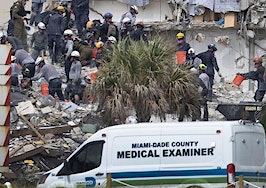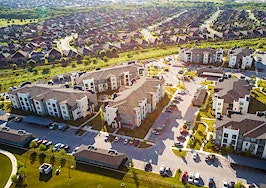The partial collapse of a luxury condo building in Surfside, Florida, on June 24 has given some homeowners and homebuyers in Florida pause as they consider where they currently live and where they may want to live next.
The seemingly unprompted disaster has left many wondering what other secrets buildings may be hiding beneath the surface that could later lead to calamity. And some real estate agents say the consequences of the disaster may change the condominium market forever.

Frank Navarro | Credit: Douglas Elliman
“You’re realizing that [the partially collapsed Surfside condo] building needed a lot of maintenance, and there was a lot of erosion and a lot of this and a lot of that and, of course, it wasn’t handled or taken care of properly,” Frank Navarro, a Realtor at Douglas Elliman in Miami, told Inman. “So, all these other buildings are now going to step it up like they have never before. And the city as well. It’s going to be really hard on these buildings.”

Marco Reyes | Credit: Galleria International Realty
A number of Florida agents Inman spoke with for this story said that their clients who are interested in beachside or condo properties have already started to ask new questions in the wake of the collapse.
“They are asking, if it’s an old building, over 40 years, they are asking for the 40-year recertification,” Marco Reyes, an agent with Galleria International Realty, told Inman. “If it’s [been] done, and any assessment [that’s resulted]. That’s what they’re asking the most.”
Champlain Towers South, the condo building that collapsed in Surfside, had just begun repairs as part of Florida’s required 40-year recertification process. But now, it appears those repairs began too late.
Desiree Avila, an agent with Charles Rutenberg Realty in Fort Lauderdale, said she had a client reverse course on searching for waterfront properties altogether in the wake of the tragedy.

Desiree Avila | Credit: Charles Rutenberg Realty
“One client, he thought about moving back to the beach because he was living on the beach and then he moved out a little further west. Then after the collapse he goes, ‘You know, Desiree, I don’t think I want to buy that close to the water anymore,'” Avila said. “So he decided to buy another condo in the same area [inland], because the one he was looking at was literally on the beach — it was one of those beachfront [condo complexes], exactly like the one that collapsed.”
Bradley Fairman, a broker with eXp Realty on Florida’s Space Coast, also noted that, while newer condos seem to still be moving through the market at a steady pace, he speculated that older units would have a tougher time selling for the foreseeable future.

Brad Fairman | Credit: LinkedIn
“I think maybe the older condos might have taken a hit in terms of buyers maybe thinking more about what happened down south, and maybe not wanting to go with such an older building,” Fairman said.
The agents Inman spoke with said none of their past condo clients had yet approached them about unloading those properties due to safety concerns or concerns of declining values in the wake of the collapse. But, Navarro told Inman that some of his past condo clients have mentioned that they want more transparency about the state of their building moving forward.
“What they want more is an answer — to make sure that their building is secure,” Navarro said.
Potential buyers and current condo owners are demanding information from condo associations, a new market demand that is unlikely to change anytime soon as the horrific accident remains fresh in consumers’ minds.
Cara Ameer, an agent with Coldwell Banker in Northeast Florida and an Inman Contributor, said condo associations are going to have to be much more forthcoming about what kinds of decisions are being made during board meetings and why.

Cara Ameer | Credit: Coldwell Banker
“That’s, I think, going to have to be standard,” Ameer said. “I think a buyer has a right to know what kind of discussions have gone on in a condo board meeting with respect to any type of structural work or repairs.”
And even if they do provide the kind of information buyers and homeowners are looking for, Ameer surmised that a lot more potential buyers would be hiring their own engineers to do full building inspections, since confidence in condo boards has likely hit a low.
“I just don’t even know [that] all the assurance in the world [will cut it], unless they’ve undertaken to get a proof of what has been done and that it’s been signed off on,” Ameer said. “And even then, as we saw with this building in Surfside, who’s signing off on it? What is the integrity of that person? The fact that there’s not a municipality [involved] … the counties, the cities, they’re not overseeing these buildings. I mean, that may change and I think that needs to change, but up until now, it’s been the condo association.”
A typical home inspection conducted for a condo purchase is also pretty limited in its scope, Ameer said. An inspector will inspect the unit itself, but other than that, they may not look at much of the rest of the building in detail, unless the exterior air conditioning unit is on the roof of the building, which would prompt an inspector to at least look at the roof of the building as well.
“But, generally, it’s sort of a false sense of comfort, right?” Ameer said. “You’re just kind of from the walls in, and if they don’t notice any structural issues, then they may say everything looks fine.”
Navarro noted that, if anything good can be said to have come out of the tragedy, at least “all the buildings are definitely stepping up” and making sure that they’re in structurally sound condition. “So that’s a really good thing to have at this point.”
Ameer added that the events in Surfside will likely set off a “new normal” for the condo market — one that’s, hopefully, a lot safer.
“I think that this situation in Surfside is going to spark a ‘new normal’ in the condominium sector markets, not just in Florida, but I think coast-to-coast,” Ameer said. “There’s old condo buildings throughout the country, especially if they’re near any body of water … you still could have issues that are not being addressed that are putting people at risk.”
“It’s unfortunate, like so many things in life, it takes a tragedy to spark change for the better but I hope that if anything comes out of this that there’s more checks and balances and oversight for everybody’s sake involved in condominium living, whether that’s existing residents or future residents or the real estate industry as a whole,” she added. “We’ll be watching, right?”








